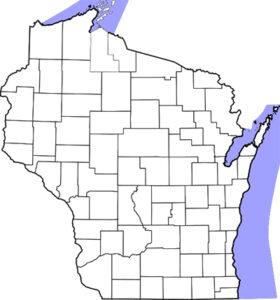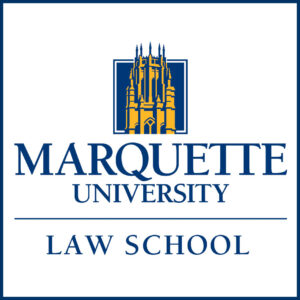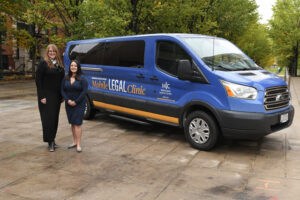Reaching Rural Areas with Our Pro Bono Efforts
 A series of blog posts was not my plan, more than a month ago, when I wrote about the American Association of Law Schools’ pro bono honor roll with respect to Marquette Law School. Yet the work of volunteer students and lawyers, coordinated by our Office of Public Service, is so extensive that it has inspired me to continue with what I now project as a total of ten entries by the end of the semester (posts thus far, beyond the first, are available here, here, here, and here). My self-assigned topic for this week is the expansion of our pro bono outreach to encompass rural areas in Wisconsin.
A series of blog posts was not my plan, more than a month ago, when I wrote about the American Association of Law Schools’ pro bono honor roll with respect to Marquette Law School. Yet the work of volunteer students and lawyers, coordinated by our Office of Public Service, is so extensive that it has inspired me to continue with what I now project as a total of ten entries by the end of the semester (posts thus far, beyond the first, are available here, here, here, and here). My self-assigned topic for this week is the expansion of our pro bono outreach to encompass rural areas in Wisconsin.
Some context is helpful. Last week’s post sketched out some of the work of the Marquette Volunteer Legal Clinics (MVLCs) through volunteer students (all future Marquette lawyers, we hope) and volunteer lawyers (this past year, half of them our alumni and half graduates of other law schools). For more than twenty years now, the MVLCs have served our Milwaukee neighbors at various community-based locations. With the onset of the pandemic in early 2020, the MVLCs were forced—like nearly every organization—to pivot to provide services remotely. Starting a few weeks later, in early April of that year, the first remote MVLC was open on Zoom. The remote MVLCs came to operate nearly every day of the week and over time grew to serve almost as many people each month as had been the case in the established community-based walk-in clinics.
That brings us to the fall of 2020: the MVLCs’ history of trusted service and solid experience in the brief legal advice context prompted the Business Law Section of the State Bar of Wisconsin to approach us. The bar section was interested in the creation of a clinic to help address the issues faced by Wisconsin small businesses in the COVID-19 pandemic. Our Office of Public Service recruited attorneys and law students and built the necessary “infrastructure” to host the clinic on Zoom. The clinic saw its first clients in early 2021.
To date, in a partnership with the bar section, the MVLC Small Business Clinic has—the volunteer attorneys and students have—served nearly 200 small businesses around the state. Operating remotely each week, the clinic advises on legal issues involving contracts, employment, entity formation, real estate, intellectual property, tax, and questions related to ongoing compliance and operation. Clients in 32 counties across Wisconsin have reached the clinic. It has especially attracted volunteer Marquette law students interested in pro bono service in a transactional (as opposed to litigation) context.
In any event, this experience led to a further innovation. Fall 2021 brought a return to in-person services for the civil and family-law MVLCs and also this question: Could we capitalize on the infrastructure and experience built up during the pandemic? The answer “yes” was clear to my colleagues in the Law School’s Office of Public Service—led by Angela F. Schultz, assistant dean for public service, and Katie Mertz, L’11, director of pro bono and public service.
More specifically, as of this fall, they created another new MVLC: the Rural Clinic. After all, the remote-clinic model, its value demonstrated in the small-business sphere, was well-suited more generally for serving clients statewide—an interest that Dean Schultz and Director Mertz had long discussed as a critical step in bridging the access-to-justice gap.
How have we done? In its first month, this fall, the Rural Clinic was open (online, of course) four times. It served 19 clients (10 civil, 9 family) through the work of 16 volunteer attorneys and 24 volunteer law students. Clients were from counties across the state—Lafayette, Juneau, Winnebago, Dane, Brown, Monroe, Green Lake, La Crosse, Marathon, Shawano (non-native Wisconsinites should be careful with that county’s pronunciation), Sauk, Lincoln, Eau Claire, Manitowoc, Sawyer, and Waushara.
Clients come to the Rural Clinic with legal issues similar to those presented in the Milwaukee-based MVLCs—e.g., landlord/tenant, small claims, divorce, child custody, and guardianship needs. Yet individuals seeking brief legal advice from the Rural Clinic may have even fewer other places to turn for help.
More could be said: The valuable lessons of the initial COVID physical shutdown of the spring of 2020 go beyond the Rural Clinic. A separate remote MVLC continues, on Monday afternoons, to serve clients in the Milwaukee region who are unable to attend an in-person clinic for one reason or another.
Perhaps most notably, from a long-term perspective, both the Small Business Clinic and the Rural Clinic have led to new attorney volunteers—many of them, like the clients they serve, from around this great state. (Anyone interested may contact Director Mertz.)
Marquette Law School is grateful for their work and that of our students—for the opportunity to serve.

 The spirit and ideals underlying Marquette Law School’s embrace of pro bono work are timeless—part of our Catholic, Jesuit heritage and mission and reflecting the best traditions of the legal profession. Yet there are some key dates in our history, and, without doubt, one of them is from just more than 20 years ago.
The spirit and ideals underlying Marquette Law School’s embrace of pro bono work are timeless—part of our Catholic, Jesuit heritage and mission and reflecting the best traditions of the legal profession. Yet there are some key dates in our history, and, without doubt, one of them is from just more than 20 years ago.